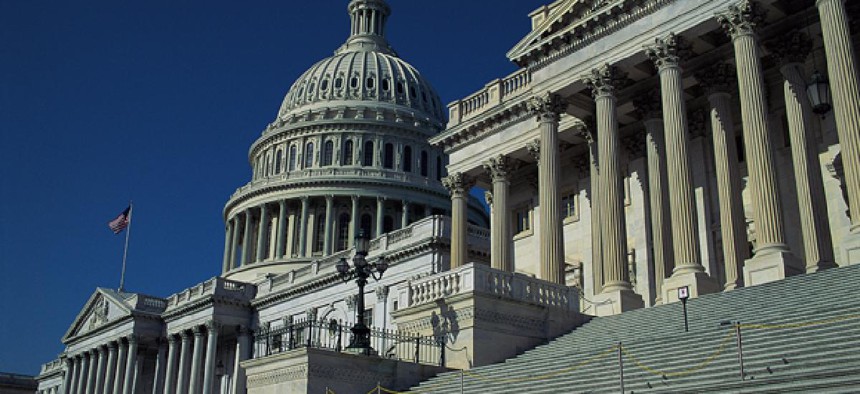
Thinkstock
House to debate Defense bills with pay, job implications for feds
Lawmakers and administration differ on civilian salaries.
The Obama administration’s fight with House Republicans over fiscal 2013 spending takes center stage this week as the House votes on two key pieces of legislation -- its defense spending bill, and the Sequestration Transparency Act.
Debate on the $608 billion Defense appropriations bill is slated to begin Wednesday. The White House threatened in late June to veto the legislation, citing extra spending that departs from the 2011 Budget Control Act and would require harmful cuts to other areas of government.
Under the Budget Control Act, the Defense Department must find $487 billion in savings in its budget over the next 10 years. If sequestration kicks in, then it will face $600 billion in additional cuts over 10 years, as part of $1.2 trillion in cuts governmentwide. The House’s defense spending bill, which provides $519.2 billion in nonwar funding, is more than $3 billion above President Obama’s budget request.
Among the administration’s many objections to the House spending bill is its silence on a pay raise for the department’s civilian employees, and its rejection of White House proposals to increase TRICARE fees to generate savings.
Both the House’s spending bill and its Defense authorization bill include a 1.7 percent pay raise for military members, in keeping with Obama’s fiscal 2013 proposal.
Consistent with other House appropriations bills, the defense spending measure does not include President Obama’s recommended 0.5 percent pay raise for civilians, a trend the White House has called “neither sustainable nor desirable.”
In its fiscal 2013 proposal, the administration also suggested increasing premiums for TRICARE retirees. Under the proposal, TRICARE retirees under the family plan would see their premiums increase between $31 and $128 per month. The White House’s budget request also includes new co-pays; new prime, standard and extra enrollment fees; adjustments to deductibles; and catastrophic coverage caps. Those changes, the administration estimates, will save Defense about $12.1 billion over the next 10 years.
The Senate Defense Appropriations Subcommittee plans to mark up its version of the bill sometime before the August recess.
House leadership also plans to bring legislation to the floor this week requiring the White House to disclose details of how federal agencies will implement the mandatory across-the-board budget cuts if the sequestration threat goes into effect.
The bill, known as the Sequestration Transparency Act, has passed the House Budget Committee and passed the full Senate in June as part of the farm bill. It requires the president to submit a report to Congress within 30 days of enactment that includes details of agencies’ sequester plans.
The legislation, sponsored by Reps. Jeb Hensarling, R-Texas, and Budget Chairman Paul Ryan, R-Wis., comes amid mounting discussion on Capitol Hill about the realities of sequestration. House Republicans have claimed that former Office of Management and Budget Director Jack Lew told Defense Secretary Leon Panetta not to assume a budget deal would be struck in time to fend off sequestration on Jan. 2, 2013.
Rep. Chris Van Hollen, D-Md., recommended a substitute to the Sequestration Transparency Act before its passage by the House Budget Committee. His plan would have directly headed off sequestration for one year through cutting some farm support payments and eliminating tax breaks for major oil companies. Ryan led an effort to strike down that proposal. The bill is slated to come up for a vote this week.






